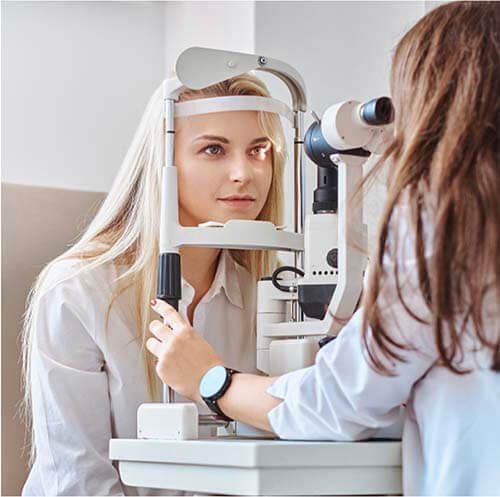The Importance of Routine Eye Tests: Insights From a Seasoned Optometrist
Regular eye exams work as a crucial element of healthcare that extends beyond plain vision correction. A skilled ophthalmologist can give insights into just how these examinations not just spot usual eye problems but likewise expose underlying health and wellness concerns that might otherwise go undetected. The silent development of diseases such as glaucoma and macular degeneration emphasizes the necessity of early detection. Understanding the regularity and importance of these evaluations can ultimately affect one's lasting health trajectory, elevating the question of just how usually individuals should prioritize their eye wellness in the context of general wellness.
Benefits of Routine Eye Examinations
Although many people might ignore the importance of routine eye tests, these evaluations play an essential duty in keeping general wellness and health. Normal eye examinations offer not just to evaluate vision yet also to spot early indications of systemic health issues, consisting of diabetes and hypertension. By recognizing these conditions at their inception, people can receive prompt interventions, considerably boosting long-term outcomes.
Additionally, eye tests can assist in keeping an eye on existing health issues, guaranteeing that any kind of modifications in vision or eye health and wellness are without delay attended to (optometrist). The evaluations allow for individualized recommendations relating to glasses, way of life adjustments, and safety measures against prospective eye strain or damages
Beyond physical health, the benefits of normal eye exams include boosting lifestyle. Boosted vision promotes far better performance in day-to-day tasks, from reviewing to driving, thereby adding to higher self-reliance and security. Eventually, focusing on eye tests fosters a proactive technique to health and wellness administration, equipping people to organize their wellness. Routine exams are an important part of a thorough health care strategy, guaranteeing that both vision and general health are protected throughout life.
Common Eye Issues Detected
Regular eye tests contribute in discovering a variety of usual eye conditions that can dramatically affect vision and overall wellness. Among one of the most widespread problems identified throughout these exams are refractive errors, including myopia (nearsightedness), hyperopia (farsightedness), and astigmatism. These problems usually show up as obscured vision and can be easily remedied with prescription glasses or call lenses.
In addition, cataracts, which create clouding of the lens, are regularly identified in older adults. This problem can cause reduced vision and needs surgical intervention for resolution. One more common issue is glaucoma, a group of eye diseases that harm the optic nerve, often connected to increased intraocular stress. Early detection is crucial as it can protect against permanent vision loss.
Age-related macular degeneration (AMD) is one more substantial problem that influences central vision, particularly in individuals over 50. Lastly, diabetic person retinopathy, a difficulty of diabetes mellitus, can cause severe vision problems otherwise kept track of frequently. Through detailed eye exams, these problems can be recognized early, permitting prompt management and therapy to protect vision and boost lifestyle.
Relevance of Early Discovery
Early detection of eye conditions plays a crucial role in protecting vision and preventing considerable health problems. Lots of eye illness, such as glaucoma, diabetic person retinopathy, and age-related macular deterioration, can proceed calmly without recognizable signs in their very early phases. By the time signs and symptoms manifest, irreversible damage may have taken place, leading to permanent vision loss.
Regular eye exams facilitate early diagnosis, permitting prompt treatment and therapy. For instance, dealing with elevated intraocular stress can avoid the start of glaucoma, while handling blood sugar degrees can considerably lower the danger of diabetic person retinopathy. Additionally, problems like cataracts can be efficiently managed with medical treatment when determined early.

How Usually Should You Visit?
Figuring out the regularity of eye tests is important for preserving ideal eye health and wellness and vision. The basic referral for grownups is to have a comprehensive eye exam every one to two years, depending upon private threat factors read the article and age. For individuals aged 18 to 60, an examination every 2 years is commonly sufficient if no vision problems exist. Nevertheless, those over 60 need to consider annual exams, as the risk of age-related problems raises considerably.
People with details risk factors, such as a family history of eye disease, diabetic issues, or existing vision troubles, may call for more regular evaluations. Youngsters ought to have their initial eye exam at six months old, adhered to by additional exams at age three and before getting in school. Routine examinations throughout youth are crucial as vision can alter swiftly throughout developing years.
Ultimately, the regularity of sees should be tailored per individual's scenarios, including way of living, work-related risks, and any pre-existing eye conditions. Consulting with an eye treatment expert can supply personalized referrals, guaranteeing that your eye health is consistently monitored and kept.
Tips for Your Eye Test
Planning for your eye exam can enhance the performance of the browse through and make sure an extensive assessment of your eye wellness. To optimize your time with the eye physician, it is vital to gather relevant details before your visit. Start by assembling a list of any drugs you are currently taking, including over-the-counter medications and supplements, as these can impact eye wellness.
In addition, document any type of signs and symptoms you have experienced, such as news obscured vision, discomfort, or headaches. This details will help your eye doctor in diagnosing prospective concerns.
It is additionally beneficial to have a family history of eye conditions at hand, as genetic elements can contribute to your eye health and wellness. Lastly, think about arranging your test for a time when you are less hurried, allowing you to ask concerns and discuss your issues completely. By preparing appropriately, you ensure that your eye examination is efficient and that your optometrist has all the necessary info to provide the finest treatment feasible.

Verdict
Normal eye exams play a crucial role in keeping both vision and total wellness. They help with the very early discovery of various eye conditions and systemic issues, enabling prompt treatment. The referrals for regularity highlight the importance of aggressive care. Applying basic primary suggestions can boost the assessment experience. Ultimately, prioritizing thorough eye examinations contributes dramatically to the preservation of vision and the renovation of quality of life, highlighting the need of routine eye treatment in preventive health care strategies.
Routine eye tests are instrumental in finding a variety of common eye problems that can dramatically affect vision and general health.Establishing the regularity of eye exams is vital for keeping optimum eye wellness and vision.Preparing for your eye exam can enhance the effectiveness of the check out and make sure an extensive examination of your eye wellness (optometrist). By preparing appropriately, you ensure that Your Domain Name your eye examination is effective and that your eye medical professional has all the required info to supply the ideal treatment possible
Ultimately, prioritizing detailed eye examinations adds significantly to the preservation of vision and the improvement of quality of life, underlining the necessity of routine eye care in precautionary medical care methods.